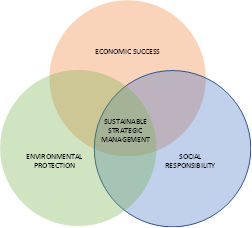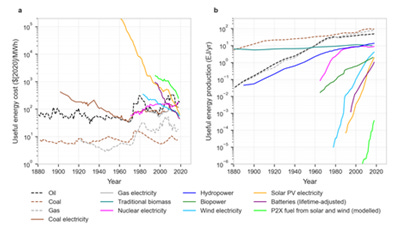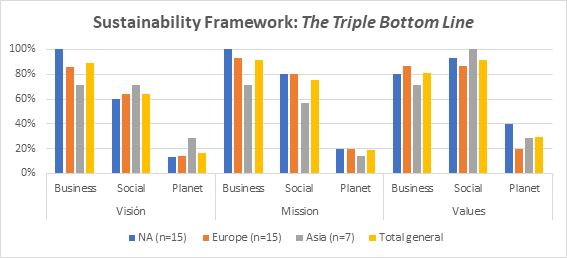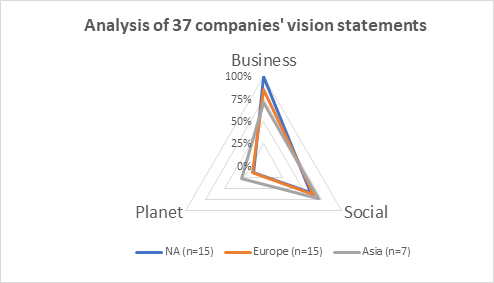Good morning,
This is the first launch of our Strategy Management and Sustainability newsletter that will be curated by students of the Strategy Management Course at Carlos III University of Madrid (UC3M). Although this course takes place in Madrid, our students come from different countries, so we hope to integrate this diversity in our next newsletters.
In this newsletter you will learn about The Triple Bottom (Economic, Social and Environmental), a sustainability framework. You will discover why we say most companies don't pass on sustainability and how some countries are demanding support for global climate goals from large companies or are implementing its national energy strategic plans. For that you need to know the technologies’ maturity.
The following companies are mentioned too:
§ Ethiopian Airlines (Business and Social axis) ⬆️
§ Starbucks (Environmental axis) ⬆️
§ Amazon (Social/Health axis) ⬇️
Gloria Álvarez Hernández and Samira Dias Dos Reis
Strategic Management Professors at UC3M
Today's newsletter is 1555 words, a 6.2-minute read.
A framework for Sustainable Strategic Management: The Triple Bottom Line
What: Elkington (1997) came up with the triple bottom line framework in which sustainability is achievable only if organizations can earn their economic profits in ways that are socially and ecologically responsible.
Why it matters: Using the triple bottom line as a managerial framework enables organizations to map out a future that is consistent with the three axes of sustainability. Further, the framework allows managers to focus their organizational initiatives more clearly within a sustainable strategic management where economic success, social responsibility, and/or ecological/health intersect.
Source: Stead, W. E., Stead, J. G., & Starik, M. (2014). Sustainable strategic management. Armonk, NY: M. E.
#Trends. Countries
🇫🇷 France bets on renewables and nuclear power to achieve energy sovereignty
France could decide to build six new nuclear EPR reactors. The country wouldn’t launch new EPR reactor projects until the completion of the Flamanville EPR station, which is running a decade behind schedule and has produced a cost three times higher than previously estimated.
Why it matters. France's national energy strategy with a mix of nuclear electricity and new alternative energies can pave the way to become an energy power that does not depend on other countries.


🇬🇧 UK government urges FTSE 100 companies to set net zero targets
The Financial Times (August 2021) reported that Andrew Griffith, the UK’s net zero champion, has written a letter to the CEOs of the 100 FTSE companies to gain corporate support towards global climate goals and set zero net targets. 47 companies have already signed up for the race to zero campaign so far, including AstraZeneca, BT, Vodafone, J Sainsbury and Unilever.
Why it matters. Although UK became the first major economy to pass net zero emission law in 2019, the government has also come under fire for repeated delays in the publication of key decarbonization strategies. Griffith wants to encourage businesses to seize the economic opportunity offered by the net zero transition.
Trends: Technologies
The energy transition as a business case.
Researchers at the Institute for New Economic Thinking (INET at University of Oxford) have estimated future energy systems costs and have found that, compared “to continuing with a fossil-fuel-based system, a rapid green energy transition will likely result in overall net savings of many trillions of dollars -even without accounting for climate damages or co-benefits of climate policy”.
Why it matters. Governments and companies can use the results of this research to plan the energy transition and seek the best energy mix strategy aligned with their own resources and capabilities.
#Companies
Most companies don't pass on sustainability
What: We did a quick and collaborative exercise in the Strategic Management class. We divide the class into groups of 3 or 4 students. Each group had to choose 2 or 3 companies from different continents in the same sector (Food & Drinks, Pharma, Automotive, ecommerce, social media, Telecoms ...) and analyze whether the vision, mission and values of those companies incorporate the following sustainability axis: business, social and planet.
Applying the Triple Bottom Line framework to the vision, mission, and values of 37 companies: North America (15), Europe (15) and Asia (7). Source: UC3M strategic management class 2021
Our results: We find that most companies do not balance the three axes of sustainability well. For example, if we concentrate on analyzing the vision (“what an organization ultimately wants to achieve”) of the 37 companies, the business orientation prevails, the social orientation hardly passes, and the planet one fails dismally.
Applying the Triple Bottom Line framework to the vision statement of 37 companies. Source: UC3M strategic management class, 2021
Why it matters: Although this little exercise has methodological limitations, it teaches us that companies have a long way to go in terms of sustainability. Updating and agreeing on the vision for the long term and the missions and values to integrate all the axes of sustainability is a pending task for many companies.
Companies in this study: Air China, Alibaba, Amazon, American Airlines, BMW, Cabify, Delta, Deezer, eBAY, Ele.me, Facebook, Glovo, HBO, Iberia, ICICLE, Johnsson & Johnsson, Lagaam, Lufthansa, Meituan, Moderna, Monster, Napapijri, Nestle, Netflix, Patagonia, Pfizer, Proximus, Red bull, Ryanair, Spotify, Starbucks, Tesla, Tidal, ByteDance, Toyota, Uber, Vodafone
Source: Strategic Management Class, UC3M 2021.
Best practices
Ethiopian Airlines. This article explained how Africa’s number 1 airline avoided layouts and losses during the pandemic. In response to the COVID-19 pandemic, the company followed an emerging strategy and quickly switched the scope of its corporate strategy from the passenger segment to the cargo segment. This minimized a sharp drop in revenues, lost profits and the company didn’t exit any markets or lay off any of its 14000 employees.
Starbucks is expanding the momentum of the circular practices push the expansion of Greener Stores. On September 30, it opened its first Starbucks Greener Store in Shanghai, an “experiential” Greener Store which is designed to showcase sustainability. The design, layouts and operations of the Greener stores are built “around circular principles, waste diversion and the healthfulness of interior spaces”. According to Starbucks they work with “renewable energy, use highly efficient fixtures, and reduce energy and water use by between 25% and 30%”. Starbucks, which operates more than 30,000 cafes worldwide, has 2,317 Greener Stores out of its total 9,860 stores in US and Canada.
Room to improve
Amazon. HBR published “The Best-Perfoming CEO 100 ranking” during several years. Initially the focus of the ranking was financial performance but since 2015, HBR weighted Environmental, Social, and Governance (ESG) scores. This lead to a downsize: Jeff Bezos, who had been the top CEO every year since 2014 in financial performance dropped many positions due to the score in ESG axes and even failed to make it to the 2019 HBR list.
Various scandals on working conditions of the skilled and un-skilled workers may have contributed to Amazon’s poor sustainability performance (NYTimes,2015; UK warehouses, 2017; Black Friday, 2016; Trade’s union pressures,2017; The Atlantic’s report on San Bernardino, 2018; Amazon’s aggressive campaigns against the formation of a union, 2021)
However, for the first time since 1997, Jeff Bezos, just before leaving his position a CEO devoted a large space in its last Amazon stakeholder letter to working conditions and environmental sustainability. Bezos acknowledged Amazon "needed to do a better job for our employees" and announced the goals to become “Earth’s Bet Employer and Earth’s Safest Place to work”. Is the May 2021 Amazon shareholder letter, a tipping point?
We recommend…
📹A video: President Moon Jae-in & BTS at the Sustainable Development Goals Moment in United Nations (English). The BTS members talked about the interests of young people in environmental issues and how they seek answers to questions about how we should live the future.
📱 An Instagram account. Climabar__: Channel on social networks to disseminate information on climate change in a fun and entertaining way.
🎧 A podcast: Humanising climate data for solutions journalism. Conversation with Clayton Aldern from Grist (an independent non-profit media organization dedicated to telling stories of climate solutions and a just future). He explains “how climate research can draw on data analytics and machine learning for solution reporting”.
👩🏫 A course: Intro to Climate Science email course. A free 14-day email course that compacts everything you need to know into 5-10 minutes easy-to-read bursts.
👩💻A job. Venture Senior Associate @ Build a Climate Startup to lead technical diligence and analysis of venture creation opportunities in climate deeptech.






